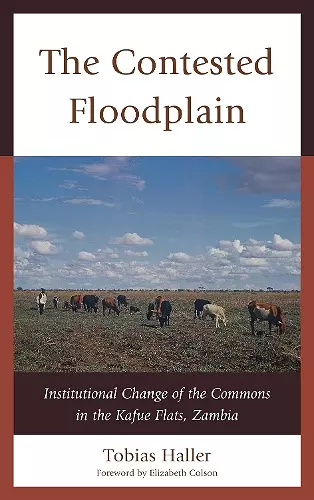The Contested Floodplain
Institutional Change of the Commons in the Kafue Flats, Zambia
Format:Hardback
Publisher:Bloomsbury Publishing PLC
Published:27th Dec '12
Currently unavailable, and unfortunately no date known when it will be back

The Contested Floodplain tells the story of institutional changes in the management of common pool resources (pasture, wildlife, and fisheries) among Ila and Balundwe agro-pastoralists and Batwa fishermen in the Kafue Flats, in southern Zambia. It explains how and why a once rich floodplain area, managed under local common property regimes, becomes a poor man’s place and a degraded resource area. Based on social anthropological field research, the book explains how well working institutions in the past, regulating communal access to resources, have turned into state property and open access or privatization. As a basis for analysis, the author uses Elinor Ostrom’s design principles for well working institutions and the approach of the New Institutionalism by Jean Ensminger. The latter approach focuses on external factors and change in relative prices. It explains how local actors face changing bargaining power and use different ideologies to legitimize and shape resource use regulations. The study focuses on the historic developments taking place since pre-colonial and colonial times up to today. Haller shows how the commons had been well regulated by local institutions in the past, often embedded in religious belief systems. He then explains the transformation from common property to state property since colonial times. When the state is unable to provide well functioning institutions due to a lack in financial income, it contributes to de facto open access and degradation of the commons. The Zambian copper-based economy has faced crisis since 1975, and many Zambians have to look for economic alternatives and find ways to profit from the lack of state control (a paradox of the present-absent state). And while the state is absent, external actors use the ideology of citizenship to justify free use of resources during conflicts with local people. Also within Zambian communities, floodplain resources are highly contested, which is illustrated through conflicts over a proposed irrigation scheme in the area. The different actors and interest groups use ideologies such as citizenship vs. being indigenous, ethnic identity vs. class conflict, and modernity vs traditional way of life to legitimize land claims.
Environmental management in Africa suffers from a dearth of deep scholarly study. Fusing Elinor Ostrom's institutional analysis, Fikret Berkes's "traditional ecological knowledge," and Jean Ensminger's theories in economic anthropology, Haller (anthropology, Univ. of Berne, Switzerland) seeks to explain why common pool resources in central Zambia are under threat of overuse and mismanagement. He presents lengthy introductions on the ecology, the people, and the history of the area before moving into the heart of his analysis. This is important, as his analysis portrays a complex web of power structures, authority figures, and ideology. Without the first several chapters, the reader would be easily lost. Fortunately, Haller's mixed qualitative and quantitative approach to moving through various levels of power successfully shows how a changing economy, legal regimes, and the environment itself threaten local management strategies. The book is written at an advanced level. Haller covers an important topic and presents a strong case study. Summing Up: Recommended. * Choice Reviews *
Haller’s extensive examination of this particular floodplain in Central Africa offers a much needed longitudinal understanding of the history of social, environmental, and institutional change leading up to the current problems of sustainable common pool resource use. . . .Taken together, Haller’s ethnography, framed with current theoretical discussion, results in a robust and important monograph in political-ecology, of which ecological and economic anthropologists, Africanists, environmental scientists, and historians should take note. . . .The ethnographic data and detail in this volume are profound, and they stand equally alongside other classics in anthropology. . . .The theoretical framework advances our understanding of institutional change, illustrated so well through this case study, and consequently stands as an example of well-integrated theory and grounded ethnography. . . .The Contested Floodplain stands as a solid scientific endeavor. * Current Anthropology *
The Contested Floodplain is the most detailed analysis to date of the impact of external institutional changes on the population and environment of an African floodplain. Starting with analysis of the cultural and socio-economic systems of pre-colonial herders, fishers, and farmers living on Zambia’s Kafue Flats, Tobias Haller explains institutional impacts associated with British and Zambian governance that converted previously viable systems of limited access commons into a degraded open access system. -- Thayer Scudder, Professor Emeritus of Anthropology, California Institute Of Technology
ISBN: 9780739169568
Dimensions: 235mm x 162mm x 40mm
Weight: 1030g
576 pages